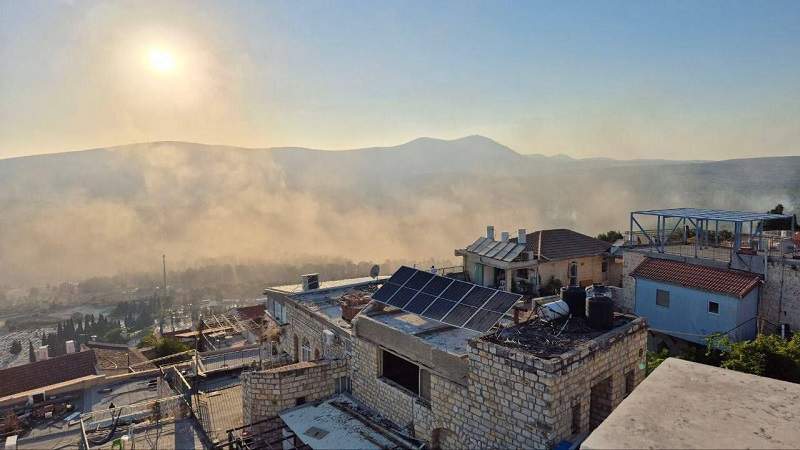Draining 'Israel' in the Lebanese Quagmire.. Hezbollah's Operations, Extensive Target List

Middle East: The claims of Israel's severe military blow to Hezbollah quickly evaporated. As soon as an Israeli military spokesperson finished presenting a false narrative about destroying Hezbollah's capabilities, a former army spokesperson came out to deny yesterday's falsehood.
These positions were abandoned locations classified by Israeli intelligence as missile launch sites based on outdated information from July 2006.
After this brief euphoria and talk of targeting 400 Hezbollah missile launchers, Hezbollah responded by bombarding Israeli northern cities with rockets, sending a message that the next retaliation would be massive. The pager and wireless bombings were nothing but war crimes, devoid of global human values and the courage of a commander or fighter.
Following repeated strikes on Haifa and Safed, the Israeli economy witnessed unprecedented decline due to various economic measures and Netanyahu's policies during the rolling Gaza war.
According to Israel’s *Globes* newspaper, "Israel's budget deficit has reached a new record high of 8.1% of GDP due to increased government and military spending as the war in Gaza entered its 11th month."
All of this led Fitch to downgrade Israel's credit rating last month from (A+) to (A), and it could drop further to (B+) if the aggression on Gaza continues. Imagine how it will be when the war completes its first year.
In addition, a large number of small businesses in Israel have shut down, with expectations that up to 60,000 companies could close by 2024, according to a report from business information company Coface BDI. This comes after 46,000 companies closed their doors following nine months of war with Gaza, in the aftermath of the October 7 attack.
Pentagon spokesman Major General Patrick Ryder told reporters, "Out of an abundance of caution, we are sending a small additional number of U.S. troops to reinforce our forces already in the region."
Netanyahu’s Goal: Total War
Netanyahu, a war criminal, finds himself trapped between two major dilemmas: the prolonged resistance that drains Israel’s resources, accustomed only to short wars with U.S. and Western support, and the prospect of a ground war that Israel knows is a major trap — possibly even hell itself, recalling the horrors of the 2006 ground war in Lebanon, and realizing that today's dynamics favor Lebanon's resistance.
Despite Netanyahu's growing failures, it is not unlikely that these intense Israeli raids on dozens of villages in southern and eastern Lebanon, which are Hezbollah’s popular base, could be a prelude to a ground attack with tanks and armored vehicles, supported by stealth fighters and F-15 and F-16 jets, similar to what happened in Gaza after October 7. It could also signal the start of bombardments on Beirut, its airport, and its southern suburbs.
However, the cost of such actions would not only be high but enormous. The response could hit "Tel Aviv" with its stockpile of sensitive and valuable targets, just like Haifa, which includes industrial complexes, kibbutzim, ports, airports, oil platforms, and gas reserves — the lifeblood of Israel, along with its technological infrastructure.
Pushing Hezbollah forces, particularly the Radwan Brigades, beyond the Litani River in the north cannot be achieved with airstrikes alone. A successful ground invasion is needed, but this is neither easy nor realistic. Hezbollah is ready to respond and won’t be alone, receiving support from other fronts, whether in occupied Palestine, Yemen, Iraq, or perhaps Syria and Iran.
Hezbollah, currently on high alert, has fired hundreds of Fadi-1 and Fadi-2 missiles at Israeli military-industrial complexes north of Haifa for three consecutive days, expanding its operations to Safed, Tiberias, and other targets in the Lower Galilee with the same missiles. This proves that Israeli raids on dozens of Lebanese villages will not intimidate or subdue them, nor force Hezbollah to surrender to Israel’s demands to retreat north of the Litani River and withdraw from the borders.
Today, it is clear that Lebanon’s Islamic Resistance is vastly different from the resistance in Gaza, with immense combat experience from the 2000 Lebanese liberation war, the 2006 war, and the 2012 Syrian war alongside the Syrian Arab Army against U.S.-backed armed opposition. Additionally, Hezbollah has significant military capabilities, including over 150,000 precision and heavy missiles, with open supply lines.
Hezbollah’s popular base remains strong and united, unfazed by rumors and misinformation, such as the Israeli army’s text messages urging Lebanese civilians to leave their homes for "safe" areas in Lebanon, which were met with defiance and solidarity with the resistance.
An Israeli commentator predicted that "Tel Aviv" could become like Sderot, the largest settlement near Gaza, where rockets rain down like rain — but with a key difference: Hezbollah’s missiles are far more powerful, accurate, and destructive than those of Gaza’s resistance factions, like Qassam, Saraya al-Quds, and Mujahideen.
-
08:55
Hamas, Islamic Jihad resistance groups hail Yemen’s Ansarullah revolutionary group over pro-Gaza attacks against the Zionist entity
08:46
Press Conference Statement: The targeting of Yemeni ports, amid the ongoing genocide against the people of Gaza, is proof of Zionist terrorism.
08:46
Press Conference Statement from Hodeidah Port: We warn of the consequences of the Zionist targeting of Hodeidah ports.
08:46
Qahim: We will target the Zionists in their vital and military headquarters, and they will regret it.
08:46
Minister of Transport, Mohamed Qahim: We are continuing to face the challenge and have resumed operations at the ports of Hodeidah and Salif.





